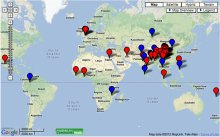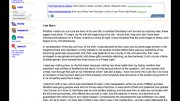
About the Project
From the project website: “The World Oral Literature Project is an urgent global initiative to document and disseminate endangered oral literatures before they disappear without record. The Project supports local communities and committed fieldworkers engaged in the collection and preservation of all forms of oral literature by providing funding for original research, alongside training in fieldwork and digital archiving methods.
For many communities around the world, the transmission of oral literature from one generation to the next lies at the heart of cultural practice. Local languages act as vehicles for the transmission of unique cultural knowledge, but the oral traditions encoded within these languages become threatened when elders die and livelihoods are disrupted. These creative works are increasingly endangered as globalisation and rapid socio-economic change exert complex pressures on smaller communities, often eroding expressive diversity and transforming culture through assimilation to more dominant ways of life. Of the world’s living languages, currently numbering over 6, 000, around half will cease to be spoken by the end of this century.
Established at the University of Cambridge in 2009 and co-located in Yale, US since 2011, the World Oral Literature Project collaborates with local communities to document their own oral narratives, and aspires to become a permanent centre for the appreciation and preservation of oral literature. The Project provides small grants to fund the collecting of oral literature, with a particular focus on the peoples of Asia and the Pacific, and on areas of cultural disturbance. In addition, the Project hosts training workshops for grant recipients and other engaged scholars. The World Oral Literature Project also publishes oral texts and occasional papers, and makes collections of oral traditions accessible through new media platforms. By stimulating the documentation of oral literature and by building a network for cooperation and collaboration, the World Oral Literature Project supports a community of committed scholars and indigenous researchers.”
The brochure below contains some nice summaries of the project’s activities and initiatives.
The full piece is presented below. Use the icons to navigate…
To see the document full-screen or print it, use the far right icon or click here.
Fieldwork Grants Programme
Again, from the project website: “The World Oral Literature Project supports local communities and fieldworkers engaged in the collection of oral literature by funding original research, and organising workshops and training in digital archiving methods. With priority for historically marginalised communities experiencing rapid socio-economic change, the Project awards small fieldwork grants for specific, short-term fieldwork. Applications from indigenous researchers and community cultural organisations are particularly welcome. Non-local researchers may also apply, but will need to demonstrate a longstanding relationship of trust, cooperation and engagement with the community whose oral literature is to be documented.”
Collections
The World Oral Literature Project hosts audio-visual data for public dissemination. Collections and collaborations can be found through the highlighted areas of the map below, or via the project’s Collections page.
Source: www.ethnosproject.org
You might also like:


Related posts:
- World Literature Homeschoolers
- World Literature Resources
- World Literature research paper topics
- World Literature. research paper
- World Literature research topics
























1942 I had my pilots license 1943 Enlisted in Army Air Corp as cadet. Flying PT-17 and AT-6 1945 They had too many pilots and I was put in Infantry. Went to Philippine Island. When War ended I went with advance party for occupation of Taegu, Korea. The Japanese soldiers were still there at their guard posts. 1946 shipped home and was dis-charged.
It wasn't so much that there were too many pilots, but the invasion of Europe was anticipated and there was a greater need for more infantry men. I was caught in a similar situation, but ended up in a general hospital as a truck driver.